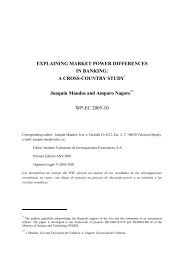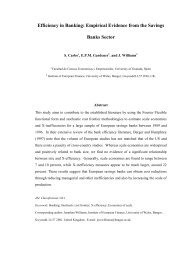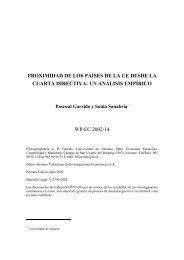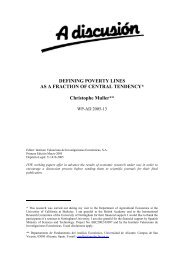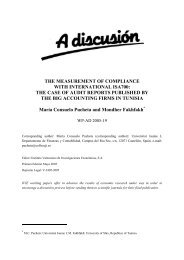Download PDF - Ivie
You also want an ePaper? Increase the reach of your titles
YUMPU automatically turns print PDFs into web optimized ePapers that Google loves.
economics on mental health is that health care costs associated with mental diseases have<br />
substantially risen in the last decades in most industrialized countries and in particularly<br />
in the UK (McVicar and Anyadike-Danes, 2008), while the dynamics of these costs may<br />
be related to economic conditions. However, apart from these negative e¤ects, there<br />
may be some positive impact on the subgroups of the unemployed: social pressure for<br />
not following the norm decreases when more people deviate from the norm, in this case<br />
become unemployed. Thus some unemployed might be at lower risk of mental problems.<br />
This study sought to assess how economic ‡uctuations, through changes in the regional<br />
unemployment rate, a¤ect the mental health of individuals who are active on the labor<br />
market. We use the UK’s Labour Force Survey from 1997 to 2010 in order to clarify<br />
whether increases in the regional unemployment rate a¤ect mental problems. Since the<br />
unemployment rate in‡uences people di¤erently depending on their employment status<br />
we control for it. We show that it is important to correct for endogeneity of the former,<br />
otherwise the results are biased.<br />
The obtained results suggest that, when the economy deteriorates, married employed<br />
men, married employed and unemployed women are more likely to su¤er depression or anxiety.<br />
Employed married men may have depressive thought about their working prospects<br />
in the light of higher unemployment and worry that they will be unable to provide su¢ -<br />
cient …nancial support for their families. Moreover, jobs are related to social status and<br />
self-assertion, and they therefore could be depressed due to fear of losing these social<br />
identi…cations. In the case of women, the results are more complex. Employed married<br />
women are as likely to su¤er depression in recession as employed married men, while<br />
employed single women are at higher risk. This di¤erence could be attributed to greater<br />
economic resources associated with marriage. However, the unemployed married women<br />
are even at higher risk of mental problems in recessions than single ones, which might be<br />
related to power in the family related to employment, that married women lose once they<br />
became unemployed. The interesting part is that single unemployed men are at lower risk<br />
of mental problems compared to all above groups. Several factors could be responsible<br />
for this. The …rst is that social pressure on the unemployed in bad times is much lower,<br />
than when there are just a few unemployed people. Society seems to be more tolerant<br />
and compassionate with respect to unemployed single men when unemployment is widespread.<br />
And second, other unemployed people could provide emotional support, which in<br />
the case of mental problems such as anxiety is of great importance. Several robustness<br />
checks con…rm our …ndings.<br />
Some limitations of the research regarding data unavailability exist. First, the probability<br />
of becoming unemployed is di¤erent depending on the educational level of the<br />
individual (Nickell, 1979) and we would thus rather de…ne the regional gender-speci…c<br />
unemployment rate at educational level as well. Unfortunately, the ONS does not provide<br />
information about regional unemployment rates by educational attainment. Second, information<br />
is needed about the spouse’s employment status to reveal the mechanism behind<br />
the di¤erential e¤ect of economic conditions on mental problems among men and women.<br />
Since LFS is not a household survey, it does not provide information about spouses. Future<br />
research should take these limitations into consideration and use longitudinal data<br />
to account for possible individual unobservable e¤ects.<br />
Our results are in line with previous research (in particular Ruhm, 2003; Clark, 2003,<br />
2009, 2010; Te¤t, 2011a, 2011b), while we provide wider evidence related to subgroups.<br />
18<br />
20







